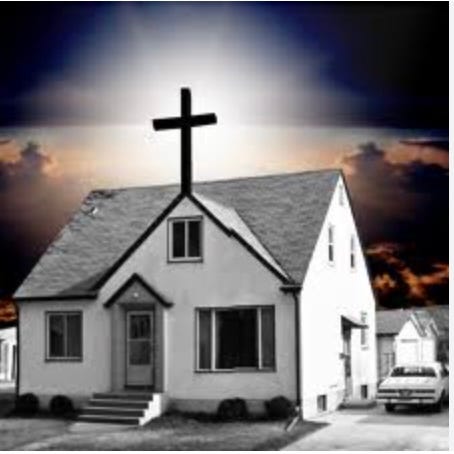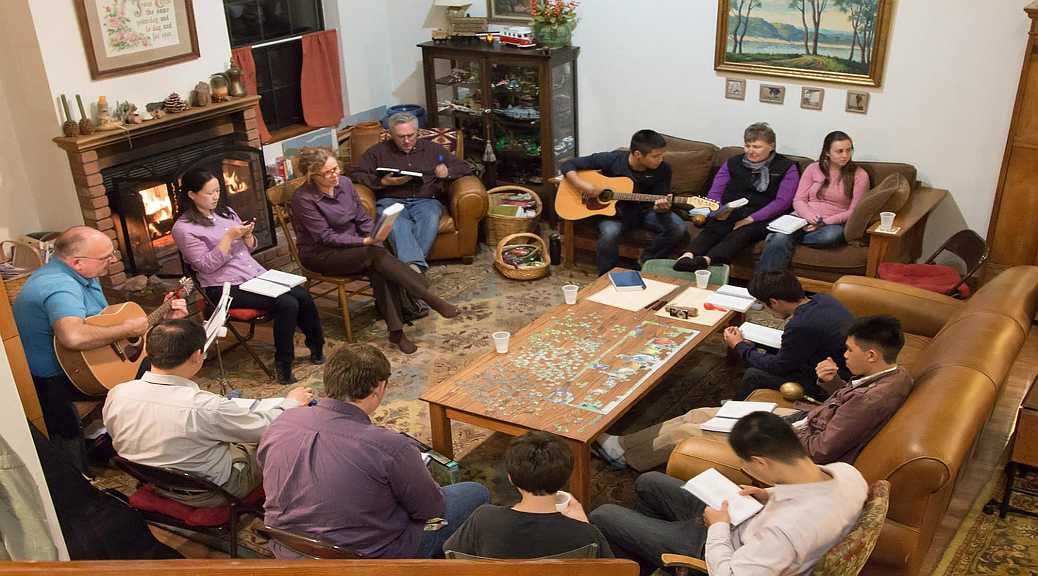How to Start a Simple Church: From First Conversations to Thriving Faith Communities
The Simple Tools for Starting a Simple Church
Note: If you feel called by God to launch a simple church, don’t go alone! Find me at kevin@ourbeststory.com and let’s partner up. Or let me find someone close to you who can co-labor in your mission field! God is on the move. If you need a tribe to journey with, check us out at disciplemakingcollective.com.
2nd Note: In this article, I use simple church, house church, and micro-church interchangeably to cover a broader audience, but they can all be launched with these simple universal tools.
Imagine this!
The most natural experience of your day could become the catalyst for learning how to start a simple church community. That's how God works. He uses everyday people to lead transformational communities committed to His mission, spreading His BEST NEWS to a world desperate and hungry for answers.
We all have water-cooler discussions. The average person has around 85 casual conversations a week. Some of you, who are more talkative and outgoing (myself included), may have as many as 200. Can you picture those 85+ casual conversations serving as 85 opportunities for God to radically transform lives where you LIVE, LEARN, WORK, and PLAY?
What if knowing how to start a simple church wasn't reserved for pastors and missionaries, but was actually the calling of every single follower of Jesus?
Here's the scoop: the pathway from a simple spiritual conversation to a healthy, multiplying house church is less intimidating and more accessible than you've been taught. Starting this form of church doesn't require seminary training, professional ministry, or even a building. It just requires ORDINARY PEOPLE following the simple pattern Jesus modeled with His Apostles in the Gospels of the New Testament.
Why Simple Churches Work Today
In our fast-paced, skeptical culture, many people won’t walk into a traditional church building—but they’ll sit at your kitchen table. They’ll join you for coffee. They’ll talk about life while their kids play in the yard.
This is why the simple church model works: it’s reproducible, relational, and mission-driven. Anyone can start one, because it doesn’t rely on budgets, buildings, or programs. It relies on Jesus’ pattern—disciples making disciples, in ordinary spaces, with extraordinary Kingdom impact.
The Jesus Pattern of Making Disciples: Simple, Reproducible, Powerful
When Jesus launched His movement, He didn’t start with a strategic plan or a building campaign. He began with CONVERSATIONS. He met people where they were—at wells, in boats, walking down dusty roads, and He simply talked with them about the Kingdom of God.
Then He did something brilliant: He taught them to do the same thing. He simply asked them to “FOLLOW ME.” In other words, watch what I do, live like I live, and make disciples like I make disciples.
That’s the essence of a simple church: conversations that multiply into communities. If you’re learning how to start a house church in your home, neighborhood, or workplace, it begins not with a stage or a pulpit, but with the model Jesus showed us - sharing life, meals, stories, and the Good News in everyday settings.
How to Start a Simple Church
If you’re asking, “Where do I begin?” here’s the answer: start small. Begin with conversations in your oikos (Greek word for household—your network of relationships). Pray, invite, listen, and share. A simple church forms when those conversations grow into a regular gathering of people following Jesus together, praying, reading Scripture, sharing meals, serving, and multiplying into others.
This is not complicated, it’s simple, reproducible, and powerful. And it’s exactly how Jesus did it.
Working the Simple Church Soil: Begin with Intentional Prayer and Spiritual Conversations
Every great movement of God begins with passionate, honest, intentional prayer. Rodger Shull's study on disciple-making movements in America (buy the book here) found that the foundation of every successfully multiplying movement in America is prayer, fasting, and seeking the Lord.
“Every movement practitioner I’ve spoken with agrees that the real foundation of any successful movement is prayer, fasting, and seeking the Lord.” - Rodger Guigou Shull
With passionate prayer, we invite the Spirit of God to walk alongside us throughout our day. We ask Him to keep our eyes wide open and our senses keen for those around us who are ready to lean into the transformational work of God in their lives.
And then after passionate prayer and fasting, let’s start conversations.
My mentor, co-laborer, and friend, Dan Grider recognized that in the book of Acts several of the chapters had unique verse 42s. In each of these 42’s the disciples couldn’t stop sharing the news about their radical transformation! We call this the “Principle of the 42s”.
Acts 2:42 “They devoted themselves to listen to the apostles share about Jesus and his message”
Acts 5:42 “Day after day...they never stopped speaking about and sharing the amazing news about Jesus.”
Acts 9:42 “They spoke of what God had done all over Joppa, and many people believed in the Lord.”
Acts 10:42 “the Father compelled us to speak about these things to the people and to share our story that Jesus is the one whom God appointed as judge of the living and the dead.”
Acts 13:42 “As they were leaving the synagogue, the people invited them to speak further about the things God was up to the next time that they gathered.”
Jesus didn't launch His movement with mass rallies or marketing campaigns. He started simple intentional conversations. With a woman at a well. With fishermen mending nets. With tax collectors over dinner.
With prayer, we invite the Spirit of God to walk alongside us, opening our eyes to people ready for His work. And then we start conversations, just like Jesus did. At water wells. On fishing boats. Over dinner.
We bring Jesus wherever we find others leaning into spiritual conversations!
The pathway we're about to explore recognizes that all Kingdom work flows through relationships and conversations. But not just any conversations—spiritual conversations that have the power to change everything.
A spiritual conversation isn't a forced gospel presentation or an awkward attempt to corner someone with religious talk. As a matter of fact, we often say that the outcome of a successful spiritual conversation is NOT a spontaneous baptism. Of course, that WOULD BE included, but a successful spiritual conversation is always one that confronts tension in a person and leads to a next conversation.
A spiritual conversation will engage with the deeper questions and longings that every human heart carries. It's discovering how to navigate the natural progression from casual conversation ("How's the weather?") to crucial conversation ("I'm really struggling with my marriage") to spiritual conversation ("I wonder if God cares about what I'm going through").
This is where it all begins. One conversation. And one person showing genuine interest in another person's life and story.
The Simple Church Pathway: Simple, Biblical, Reproducible
Once someone becomes curious about Jesus through these conversations, they need a clear pathway to grow as a follower of Jesus. The beauty of the biblical model is its simplicity and reproducibility.
Here's how it unfolds:
The Seeker Group: Where Curiosity Meets Truth
When someone shows genuine interest in spiritual things, they're ready for what we call a Seeker Group. This isn't a Bible study for people who already believe, it's a safe space for spiritually curious people to explore big questions about life and faith.
Picture this —>You've had several meaningful conversations with a neighbor, coworker, or friend who has expressed curiosity about spiritual matters. You invite 2-4 of these people to meet regularly (maybe over coffee or in someone's living room) to explore life's biggest questions.
You might use a simple series like "Hope for the Sinner," "Hope for the Poor," or "Hope for the Lost.” These are stories from Scripture that speak directly to universal human needs. The goal isn't to convert anyone but to create space for honest exploration and discussion. These groups have no timelines or formality. They may last 2 weeks or 12 weeks. They are simply for the purpose of seeing who is willing to go “All In”.
Some of these seekers will lose interest and naturally exit. Others will become increasingly drawn to Jesus and His teachings. These are your Green Shoots, people showing real signs of spiritual growth and curiosity.
X-Groups: Where Disciples Are Forged
When someone decides to follow Jesus and they move from curiosity to commitment, they're ready for an X-Group. This is where real discipleship begins to happen.
An X-Group is a small, same-gender group (typically 3-5 people) that meets regularly for high-accountability spiritual growth. Think of it as a spiritual boot camp. These aren't casual Bible studies. They're intensive training grounds where new disciples learn the fundamental practices of following Jesus.
In an X-Group, participants use tools like:
The 21-Day Challenge: A structured program of daily prayer, Bible reading, and spiritual conversation practice
Three-Thirds meetings: A format that balances accountability (looking back), Scripture discovery (looking up), and mission commitment (looking forward)
Prayer mapping: Identifying and praying for people in their own relational networks
3-minute Story: Learning to share their personal testimony in a compelling, three-minute format.
The genius of X-Groups is that they're not just about personal growth—they're about multiplication. Every person in an X-Group is being trained to have spiritual conversations in their own networks and potentially launch their own Seeker Groups.
Discipling Communities: Where Faith Becomes Family
As people mature in their faith and their families want to become involved, X-Groups often evolve into Discipling Communities. These are larger, co-ed groups (usually 5-15 people) that function like extended family.
Discipling Communities practice what the early church called "one-anothering,” the 59 “one another” commands scattered throughout the New Testament.
They pray for one another, encourage one another, bear one another's burdens, confess sins to one another, and serve one another. These communities meet regularly (often weekly) and maintain the three-thirds structure, but with a broader focus on life-on-life discipleship. Children are included. Meals are shared. Real relationships are built. People practice generosity, hospitality, and mutual care.
Most importantly, everyone in a Discipling Community is actively engaged in mission. They're not just receiving ministry—they're doing ministry in their own contexts.
Simple Churches: Where a Discipling Community Becomes a Church
Here's where it gets really exciting. As Discipling Communities mature and grow, they begin practicing what we call the Nine Behaviors of Church:
Fellowship (genuine community and mutual care)
Passionate Praying (regular, earnest prayer together)
Worshiping (singing, celebrating, honoring God together)
Communion (regularly sharing the Lord's Supper)
Baptizing (immersing new believers in water)
Scripture (studying and obeying God's Word together)
Gospel sharing (actively sharing the good news)
Generous giving (sharing resources sacrificially)
Appointed leaders (recognized, accountable leadership)
When a community is regularly practicing all nine behaviors and self-identifies as a church, something beautiful happens: they self-identify as a Simple Church, Micro-Church or House Church.
They're not a small group that goes to church somewhere else. They ARE a church! They don't need permission from a denomination or a professional pastor to function as a legitimate expression of the Body of Christ. They have everything Scripture requires for a healthy local church.
The Power of Oikos: Your Built-In Mission Field
The secret to this entire pathway is understanding what the Bible calls oikos—your relational network. Your oikos includes your relatives, neighbors, coworkers, classmates, teammates, and anyone else connected to your daily life. It is the group of people with which you have a voice.
Acts 17:26-27 tells us that God has strategically placed every person in specific times and locations "so that they would seek Him and perhaps reach out for Him and find Him." Your neighborhood isn't random. Your workplace isn't accidental. Your kids' school, your gym, your favorite restaurants—these are your God-ordained mission fields.
The beauty of this approach is that you don't need to become someone else or go somewhere else to make disciples. You simply learn to see the relationships God has already given you through Kingdom eyes.
Real Disciple-Making Tools for Ordinary Disciple-Making People
This pathway succeeds because it uses simple, reproducible tools that anyone can learn:
Prayer Maps: Simple diagrams showing the people in your life, with specific prayer for their spiritual journeys
SOAPS Bible Study: A method for personal Scripture reading that focuses on Scripture, Observation, Application, Prayer, and Sharing
Three-Minute Testimonies: Your personal story of meeting Jesus, condensed into a powerful, three-minute narrative
Conversational Stepping Stones: Skills for recognizing and stewarding casual, crucial, and spiritual conversations
Three-Thirds Group Model: A meeting format that ensures every gathering includes accountability, Bible discovery, and mission commitment
These aren't complex strategies requiring years to master. They're practical tools that ordinary people can learn quickly and use immediately.
From Addition to Multiplication
Here's what makes this approach revolutionary: it's designed for multiplication, not just addition.
Traditional church models focus on getting more people to come to church services. This model focuses on training every believer to make disciples who make disciples who plant churches that plant churches.
Imagine a business owner who starts having spiritual conversations with customers and employees. Within months, several people give their lives to Christ and join an X-Group. As the group grows and families get involved, it becomes a Discipling Community. Eventually, they're baptizing new believers, sharing communion regularly, and functioning as a healthy Simple Church.
But it doesn't stop there. Each person in that church has learned the same tools and is practicing them in their own relational networks. Soon, multiple new Seeker Groups are forming, leading to new X-Groups, new Discipling Communities, and eventually new Simple Churches.
This is how movements spread. Not through programs or professionals, but through ordinary people who've learned to follow the Jesus pattern of disciple-making.
WHO HAVE LEARNED TO LOVE LIKE JESUS AND LIVE LIKE MISSIONARIES
Your Calling Is Closer Than You Think
The Great Commission wasn't given only to the twelve apostles. Jesus spoke these words to a group of over 500 followers (1 Corinthians 15:6). His command to "make disciples of all nations" was intended for every single person who claims to follow Him.
The question isn't whether you're called to make disciples. If you follow Jesus, you are. The question is whether you're willing to learn the simple, biblical pathway that makes disciple-making accessible to everyone.
Your next disciple might be the person sitting in the cubicle next to you. Your first Simple Church might grow out of conversations with your neighbors. The movement that impacts your city might start with spiritual conversations over coffee.
Where Will You Start?
This pathway has been tested in cultures around the world. It works in urban apartments and rural communities. It works with business professionals and blue-collar workers. It works with families and singles, young adults and seniors.
It works because it's not a human strategy—it's the biblical pattern Jesus modeled and the early church practiced. The harvest truly is plentiful, but the laborers are few. Not because God hasn't called enough people, but because too many of His people have been convinced that making disciples is someone else's job.
It is actually YOURS (and mine)!
Ready to Start Your Simple Church Journey?
This biblical pathway for how to start a simple church works in every culture, every setting, with every kind of person—because it's God's design. The Kingdom of God is as close as your next conversation.
When you understand how to start a simple church, you realize it's not about having perfect conditions or extensive training. It's about taking the first faithful step.
Are you ready to learn how to start a simple church in your community?
👉 If you're interested in coaching or training in these simple church tools, email me at kevin@ourbeststory.com and let's get moving toward healthy simple church multiplication in your community.
⸻






Thanks for sharing your insights here! A question: what have you found to work well for kids and teens in these settings? How do you get them connected to other believers to form community and grow together?
I see home churches on the rise